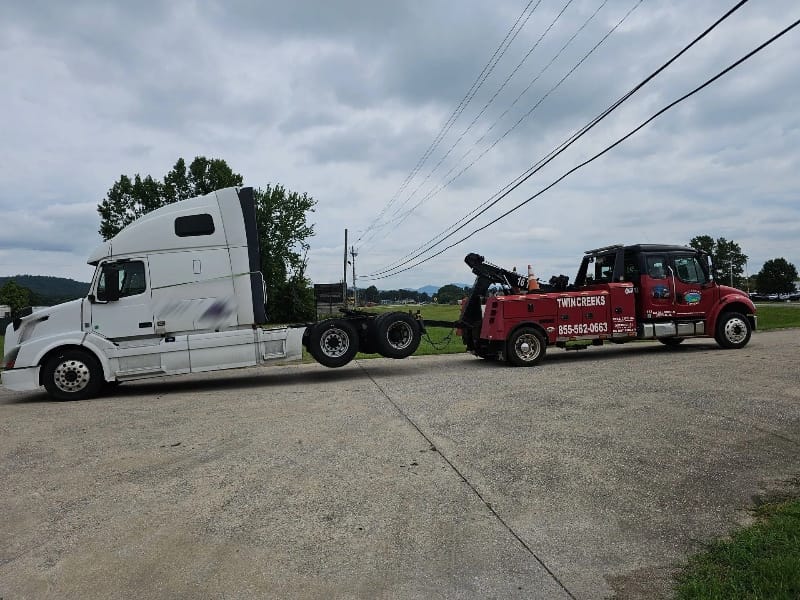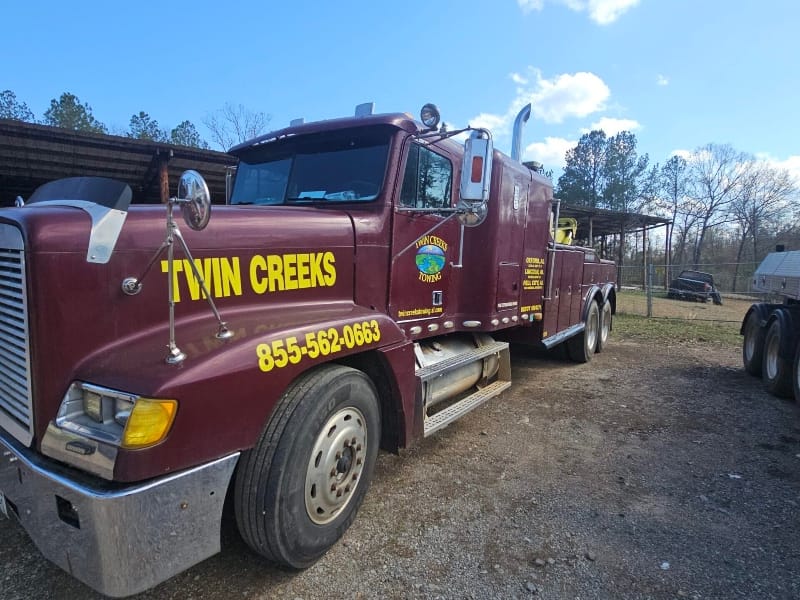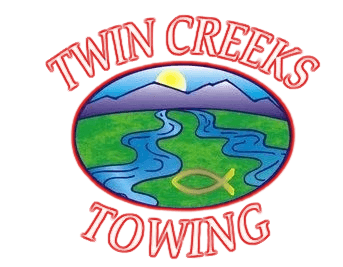Jackknife Hazards Every Trucker Should Know
A jackknife can bring a trucker’s route to a halt in seconds. It’s the kind of incident that leaves damage behind: on the truck, the cargo, and often, the driver’s schedule or confidence. We’ve handled our fair share of troubled rigs along I-20. Each one tells a similar story: something went wrong fast, and there wasn’t enough time to correct it. That’s why understanding what causes jackknifing is as helpful as it is necessary. And avoiding one? Even more important. So let’s talk about how to stay ahead of it, and how our I-20 semi towing team responds when things go south.

What Leads to a Jackknife?
Jackknifing happens when a trailer swings out from behind the cab, forming a sharp angle, like a folding pocketknife. Once that swing begins, regaining control gets exponentially harder.
Here are the most common causes:
- Sudden Braking: Slamming the brakes causes the cab to slow faster than the trailer, which keeps moving. If road conditions are poor, that trailer starts swinging.
- Speeding in Bad Weather: Ice, rain, or even light snow can reduce traction just enough to cause a slide.
- Empty or Light Loads: Less weight in the trailer means less grip on the road.
- Sharp Turns or Lane Swerves: A tight curve taken too quickly or a fast correction can upset the balance between the cab and trailer.
- Downhill Momentum: Long descents without proper gear usage can let a trailer push too hard against the cab.
Once the trailer starts swinging, there’s only a small window to recover. And sometimes, there’s no window at all.
The Warning Signs Not to Miss
There’s no such thing as a “minor” jackknife. Even a partial swing can jack up your route and your rig. But the signs show up early, if you’re watching for them.
• Trailer fishtailing, even lightly
• Cab ABS engaging more often than usual
• Braking that feels delayed or uneven
• Trailer push during downhill stretches
If we spot these signs, it’s a red flag to ease up and adjust our driving right away. The road doesn’t give second chances.
How We Stay Out of a Jackknife
Avoiding a jackknife take a great deal of luck, but there are elements the driver can control. Here are some non-negotiables when it comes to keeping rigs upright and moving forward.
Here’s what helps you stay ahead:
- Brake Early, Not Hard
Smooth, gradual braking gives both the cab and trailer time to slow together. - Watch the Load Weight
A balanced, properly secured load helps prevent sway. Light trailers? Extra caution. - Gear Down on Descents
Let the engine do the slowing, not just the brakes. - Keep Following Distance
Tailgating in a semi is a gamble. One panic stop and you’re sliding. - Respect the Weather
If traction might be bad, we slow down. No shortcut is worth a jackknife.
Responding to Jackknife Emergencies
We’ve answered many I-20 semi towing calls where jackknifed rigs ended up blocking lanes, hanging off shoulders, or worse: rolled over. In those moments, truckers don’t need lectures. They need fast, capable help.
When our I-20 semi towing team arrives, we:
- Assess the rig’s position to prevent further movement or risk
- Use winches and stabilizers to secure the vehicle before recovery
- Clear the scene as quickly as possible to minimize traffic impact
- Transport the rig to a safe location for repair or cargo transfer
There’s no cookie-cutter approach. Every jackknife is different. But experience matters. And every time we hook up, we bring the lessons we’ve learned from past recoveries.

Twin Creeks Towing & Heavy Duty Semi Truck Wrecker: I-20 Semi Towing You Can Count On
We know how fast things can go wrong out there. A few seconds of bad luck or a misjudged move can turn into a jackknifed rig, a traffic backup, or worse. That’s why we take I-20 semi towing seriously.
At Twin Creeks Towing & Heavy Duty Semi Truck Wrecker, our I-20 semi towing experts can recover rigs from ditches, guardrails, medians, and even narrow shoulders along busy stretches of I-20. We don’t cut corners. We don’t waste time. And we show up with the right gear, the right team, and the know-how to get trucks moving again.
So if a jackknife stops you in your tracks, don’t stay stuck. Call Twin Creeks Towing & Heavy Duty Semi Truck Wrecker for I-20 semi towing that gets it done.
